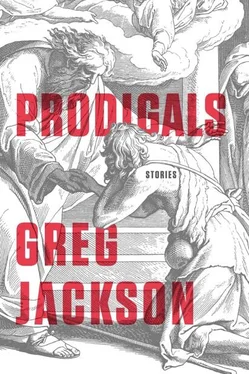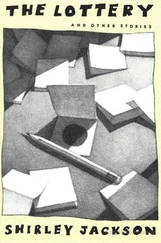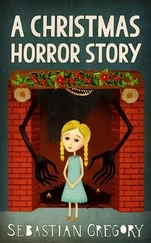“So what will we do while you’re here?” Marion said. “You’ll want to tour around, I suppose.” She sighed. “It’s funny, we live such isolated existences. I hardly know this place.”
“That’s not possible,” Vicky said. “You’ve been here, what, five years? What about the kids, what do you guys do ?”
“Yes, the poor kids,” Marion said. “They are too young to care. And we have a woman, Madame Lévesque. I play tennis in the city some days and Léo — who knows what Léo does.”
We were passing fields cleared for crops, wild slivers of uncleared fields within the forests and hills. Fields with rocky outcroppings and stone farmhouses, quaint and picturesque, with linens and dresses sailing from clotheslines. It was a windy day and at points the sun would find a hole in the clouds and unload its cache of warmth on the champagne hood of Marion’s BMW.
“What do you mean?” Vicky said, her voice as light and delicate as wind chimes.
“Léo…,” Marion said, “is peculiar these days. He spends ages in his workshop. He’s always taking long walks in the forest. Maybe he’s crazy.”
She laughed, so we laughed too.
“Does he still play?” I asked.
“No,” Marion said. She looked out the window and added softly, mostly to herself, “No, no, no.”
We pulled up to their house not long after, a large but not immodest country home, tidy on the outside and nicely fixed up, built in the French farmhouse style, with peach-colored terra-cotta roof tiles, small casement windows, stone masonry. An elegant and unpretentious house set back a half mile from the road. To the right was a fenced-in tennis court with mounted lights for night play. The net wasn’t strung, but the clay surface was neatly rolled and swept.
Marion left us in the front room with Vicky’s bags while she went to find the others. I drifted over to a desk with a visitor log and Vicky peered over my shoulder as I flipped through.
“Is this what you expected?” I said. I didn’t mean the guestbook, but I might as well have. The last entry was from five months before, late January, and the entries from the last few years were sparse. Before that, the Descoteaux had had regular visitors. I even recognized a few names as those of tennis players famous a decade ago and a French soccer star from the good national teams at the end of the century.
“So this is a bit more bizarre than I was anticipating,” Vicky said. She looked at me with one eye closed. “But I promise they’re sweet.” She kissed my cheek and then, unable to resist, took down a racket hanging with the coats to test its swing.
I looked over to see a small boy peeking at us around a corner. I grinned at him.
“Maman!” he shouted.
A moment later two slightly larger versions of the same boy appeared, and then Marion and an older woman.
“Ta gueule, Fabien,” one of the older boys said.
The boys were all very handsome and might have been dressed for a photo shoot: white cotton tennis shorts, matching boat shoes, different colored but otherwise interchangeable Lacoste pullovers with little neck zippers.
“You shouldn’t play with it in front of them,” Marion told Vicky. “Léo has forbidden tennis and predictably they desire to do nothing else.”
“Qu’est que t’a dit?” Fabien demanded, pulling his mother’s skirt.
“Arrête,” Marion said sharply. “The older two, Michel and Antoine, speak English, but Fabien is a beginner. N’est-ce pas, Fabien? Tu parles anglais ou quoi?”
“Oui,” Fabien shouted. “Pussy!”
The older boys laughed and Marion slapped Fabien awfully hard on the back of the head. “Mais vraiment. They watch too many movies,” she said.
Madame Lévesque appeared serenely oblivious to this exchange and herded the children out after we’d said our hellos.
“I can’t find Léo,” Marion said, “but c’mon, I’ll show you your room.”
* * *
By the time we settled in I’d lost any faith in my imaginary friendship with Léon Descoteaux and begun instead to imagine a prickly recluse liable to resent our being there. Marion and Vicky were off drinking wine and chatting on the garden terrace, and I had excused myself, setting up around back in a wooden chaise with my books and notepads. It was a brisk day. I was wearing a cable-knit sweater Marion had given me from Léo’s dresser. I’d found coffee in the kitchen and was finally feeling like myself again, gazing out over the lush grounds behind the Descoteaux’s house, which sloped down prettily to a pond and an orchard.
I had decided to read up on Rome. A year before, I’d written a long piece on Mexican wrestling and I’d found it easier to pick up assignments since then. This was my sixth year of freelance work, stringing together long-form nonfiction, travelogues, and the occasional trend piece. I was making just enough to get by, which meant dressing respectably, going out to dinner a few times a week, and paying nearly half the rent on our one-bedroom in Tribeca. Keeping up appearances, really. I had no savings and no prospect of any. And yet it was still a small thrill when I opened a newsstand issue to see my name in the table of contents, the words I had composed on my old battered laptop dignified by top-notch production. Friends and relatives sent notes when they’d read an article of mine, and it satisfied that old feeling, I suppose, that I was, in all my particularity, significant. I had no illusion at thirty-four that I was in fact, but I existed at the edge of the known world, and if I worried that I might get lost in my own head, which was always a fear, this public existence retrieved me, it located me on an objective terrain.
The anecdote with which I closed the wrestling piece came from an interview I’d conducted with an old wrestler, a man who agreed to talk to me only on terms of strict anonymity. He told me that when he gave up wrestling, he had thrown away his costume and never spoken again of his career. When I met him, he was a paunchy man in his fifties who chain-smoked and made a sibilant noise when he breathed. “The mask,” he said, “is everything. Without the mask, you never leave the ring.”
My Spanish was only conversational and the man had forbidden a translator, so I only realized what I had when I got back to New York and hired someone to translate the tapes. You can imagine my excitement. I remember a shiver running down my spine as I read the transcript. It was like hearing the echo of a thought I had never spoken aloud.
I was reading up on Rome and the Colosseum in the backyard when I saw a figure emerge from a patch of forest by the pond. It was a man, a bit above average height, wearing shorts and a cable-knit sweater like the one I had on. He had a beard and close-cropped hair, and he looked at the ground as he walked. I knew at once that it was Léon Descoteaux. His gait had the same overarticulated precision as his tennis game. I put down my book and stood.
He smiled when he got close. “You must be Daniel,” he said, surprising me. “We have been looking forward to your visit. I am Léon Descoteaux, but please call me Léo.”
We shook hands. “A pleasure to meet you,” I said. “I was a big fan of yours on the court.” He didn’t respond, but I saw his jaw clench once and I followed his gaze to the pond and orchard, the hills behind them. “It’s a magnificent place you have here.”
“And we shall explore it,” he said. “But now, come with me to the garden, please. I need to pick the lettuce and herbs for dinner.”
Léo was on his hands and knees in the dirt when Vicky spotted us and came running over.
“Léo!” she said.
“Victoria.” He rose and and kissed her cheeks. “We’re delighted you came. You look even more beautiful than I remember.”
Читать дальше












